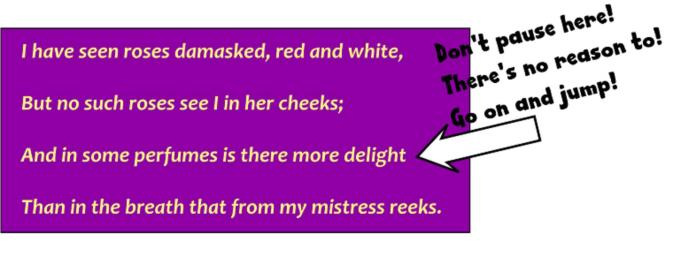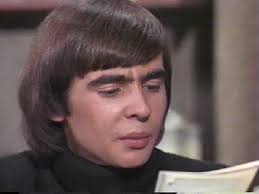Understanding poetry truly isn’t as hard as people make it out to be. With a little coaching, some jargon, and some practice, it’s a pretty easy thing.
And to appreciate it doesn’t mean that you have to learn every little thing about poetry. Trust me, there’s too much. And even poetry nerds like me don’t have it all down.
Listed below are the basics you need to get the most out of the verse you read.
- Read with the punctuation marks. Just because a line breaks doesn’t mean there’s a pause. Pause where the commas and end marks are. If there’s no punctuation, it may take a few times through the poem to figure out where to pause. Look at this piece of Shakespeare’s “My Mistress Eyes are Nothing Like the Sun.” Notice that it makes WAY more sense if you DON’T pause at the end of the line!

- Get used to re-reading. To really get a poem, you have to read it a few times. Even if it appears simple on the first pass, there will be lots more to it on the second and third time through.
- Pay attention to line breaks, capitalization, and structure. Lines are broken where they are on purpose to add emphasis or to move your eyes down the page. Words that the poet capitalizes are words that are Important, especially if it’s something that’s not usually given a capital letter.
- How it sounds helps create a feeling. Lots of soft letters in soft sounding words-

You have to hear him say “little metal bottletops.” Click here. I’m not sure why this is so funny, but it is. -m, n, s, r, l–will help create a soft feeling. Hard letters–d, t, k, p–create harsher sounds. Those sounds can mimic water or wind, or weapons and warfare depending on their usage. Those sounds create feelings, which in turn help you as the reader, develop meaning.
- Make a connection. You should be able to find some sort of connection with every poem you read. Does it remind you of your Great Aunt Tilly? Your favorite superhero? Make you question something you heard at church? Make you feel sad or angry or nostalgic? Those connections are the whole purpose of literature; poets write to express thoughts and feelings, and we read to better understand our own.
Got anything to add? Let me know about it in the comments? Like what you read? Share this somewhere! Happy National Poetry Month!